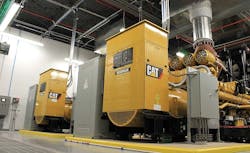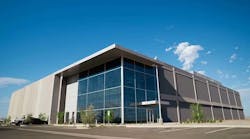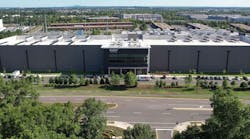The consolidation in the data center industry has accelerated in a big way in recent months, as leading players seek to keep pace with the evolving geography of the tech landscape.
This week it is CyrusOne making a significant acquisition, pushing into the Southeastern U.S. with the purchase of two facilities from Sentinel Data Centers. The $490 million transaction includes large facilities in Raleigh, North Carolina and Somerset, New Jersey which both have room for expansion.
The Raleigh data center provides fast-growing CyrusOne with a footprint in North Carolina, where Sentinel was the first player focusing on large-footprint wholesale projects, where companies lease plug-and-play data halls from service providers. CyrusOne specializes in large wholesale deals, and will have room to grow within the 420,000 square foot Raleigh building, where Sentinel has filled a 100,000 square foot Phase I and completed a 120,000 square foot Phase II. The 10 megawatt capacity is about 70 percent leased, with the opportunity to build out and lease an additional 23 megawatts (MW).
The Sentinel New Jersey data center is about 95 percent leased, with the option to add up to 22 megawatts of additional capacity.
“We are very excited about this transaction, which establishes a presence for us in the Southeast, adds a high quality portfolio of large enterprise customers, and features an attractive long-term lease profile,” said Gary Wojtaszek, president and chief executive officer of CyrusOne. “We respect the work of the Sentinel founders. Their focus on great facilities and personalized customer service matches ours. The transaction is expected to be immediately accretive and provides significant opportunities to grow the combined business and create value for our shareholders.”
Focus on the Southeast
CyrusOne has compiled an enviable track record in leasing wholesale data center space to leading companies in cloud computing. The company doesn’t disclose customers, but market watchers say recent tenant wins include Microsoft and Oracle. Its biggest deals have been in Northern Virginia, San Antonio and Phoenix, but one of the company’s strategic goals has to been to add capacity in the Southeast.
“The Raleigh-Durham market will represent the lowest power cost in CyrusOne’s portfolio and one of the lowest in the United States,” the company said.[clickToTweet tweet=”The Raleigh-Durham market will offer the lowest power cost in CyrusOne’s portfolio & one of the lowest in the U.S.” quote=”The Raleigh-Durham market will offer the lowest power cost in CyrusOne’s portfolio & one of the lowest in the U.S.”]
The acquisition highlights the growth opportunity for the data center industry in the Southeast. Those low power costs have attracted investment in Internet infrastructure in recent years, including a major expansion by Google, which has announced plans to build huge data centers in Clarksville, Tennessee and Jackson County, Alabama.
The most experienced player in the Southeast is Peak 10, which got its start in 2000 with a single data center in Jacksonville, Florida and now has 860,000 square feet of data center space across 10 markets in Florida, North Carolina, Virginia, Georgia, Kentucky and Tennessee. The company is in growth mode under new CEO Chris Downie, who previously led Telx.
Another company expanding in the Southeast is Tierpoint, which just announced plans to work with Compass Datacenters to build a new facility in Nashville. It also has a major presence in North Carolina through its 2015 acquisition of Windstream’s data center business.
Among the publicly data center REITs, QTS Realty has long been the dominant player in the Atlanta market, offering its “three Cs” of custom data centers (wholesale), colocation and cloud. The company operates two huge data centers in Atlanta, including the Metro Technology Center in the city and a facility in suburban Suwanee. Digital Realty has operations in Atlanta, Miami and Charlotte, while Equinix has facilities in Atlanta and the Miami area.
Emergence of North Carolina
North Carolina boosted its data center profile between 2007 and 2010, as aggressive economic incentives helped the state win huge projects from Google, Apple and Facebook. The three tech titans set up shop in the area west of Charlotte, taking advantage of cheap power and land, and lots of it.
Wholesale data center providers saw an opportunity in North Carolina, believing the state’s attractive economics would lure customers with larger space requirements. In 2012 both Compass Datacenters and Sentinel announced plans to build multi-tenant data centers near Durham, hoping to build business in the Research Triangle tech corridor.
The 100 kV substation supporting the Sentinel Data Centers’ project in Durham, N.C. The robust utility infrastructure allows Sentinel to offer variable resiliency plans to customers. (Photo: Sentinel Data Centers).
The Research Triangle Park area has long been an active market for technology firms. Renowned for its nexus of universities – including Duke, North Carolina and N.C. State – the area is also home to a thriving technology economy, including major data centers for IBM, Cisco, EMC and NetApp.
Last year the Sentinel Raleigh facility qualified for North Carolina’s Data Center Infrastructure Act, which provides tenants with sales tax exemptions on IT and data center equipment, as well as on electricity. The new legislation lowered the threshold for tax incentives from $250 million in investment to $75 million, and opened the benefits to multi-tenant data centers as well as single-tenant facilities.
Second Big Exit for Sentinel
Sentinel Data Centers is one of the industry’s most experienced data center developers. Founded in 2001, the company has developed more than 1.6 million square feet of data center facilities. In its early years, the company operated three data centers in Massachusetts and Connecticut, which the company sold to Digital Realty Trust in 2009 for $375 million.
Those initial sites were existing buildings that were retrofitted as data centers. In 2010, Sentinel began building again, this time opting for greenfield builds that allowed it to optimize for scalability and energy efficiency. In addition to the New Jersey and North Carolina data centers, Sentinel has a built-to-suit facility in Rockland County, New York that is fully leased to Bloomberg.
Sentinel has been among the providers that have begun to offer a variety of levels of power redundancy in its data center leases, offering flexible options for customers.
“We have known the CyrusOne team for almost ten years and have a great deal of respect for their organization,” said Josh Rabina, Sentinel’s co-founder and co-CEO. “They have earned an excellent reputation in the industry for customer service and quality, so we know our customers are in good hands.”
“We have a fantastic set of customers and investors, and we believe this to be a win-win for both of them,” added Todd Aaron, Sentinel’s co-founder and co-CEO.
More Options in New Jersey
The Somerset facility expands CyrusOne’s capacity in New Jersey, where it operates a data center in Totowa through its acquisition of Cervalis in 2015. Totowa is in Northern New Jersey, which is traditionally a retail colocation market, while the Sentinel Somerset facility is among a cluster of facilities offering wholesale space in the region around Rutgers University in Central New Jersey.
The Somerset facility houses a strong base of customers from the healthcare and financial services industries, reflecting the strong presence of the pharmaceutical and hospital sectors in New Jersey.
The New Jersey market features higher power costs, and has seen slower growth than a number of other data center markets. CyrusOne’s entry follows the acquisition by QTS Realty of a data center in nearby Piscataway that was previously operated by DuPont Fabros Technology.






